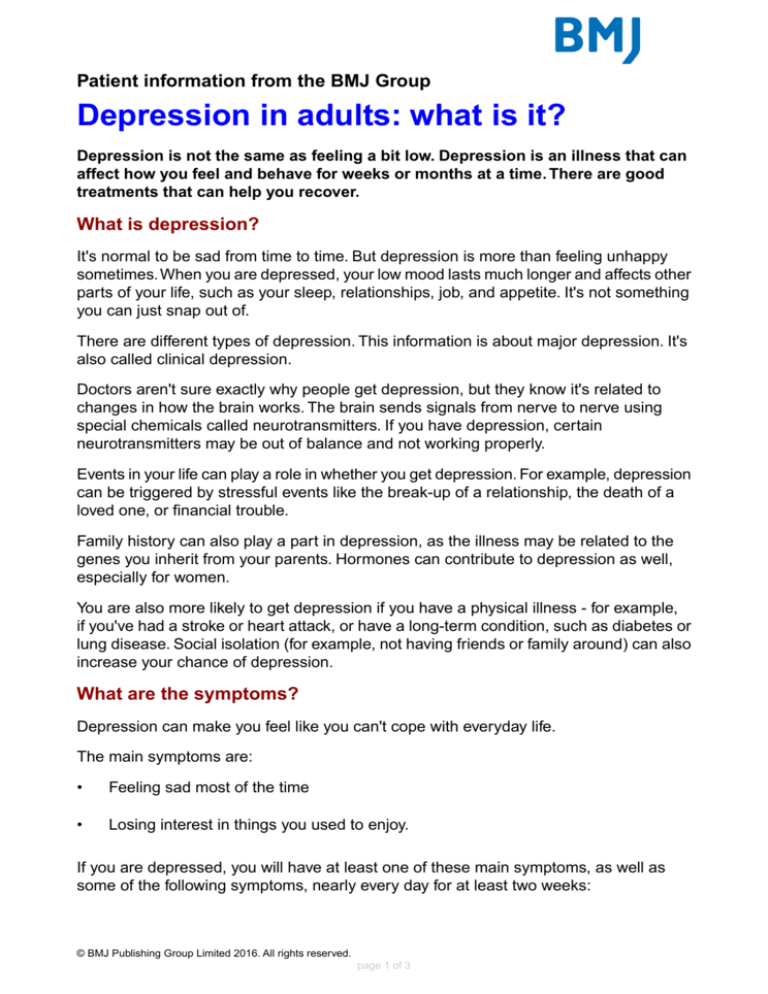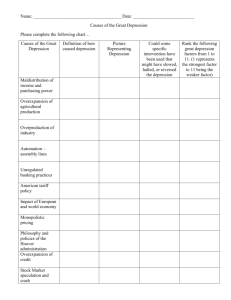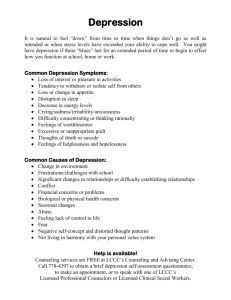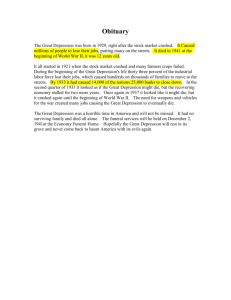
Patient information from the BMJ Group
Depression in adults: what is it?
Depression is not the same as feeling a bit low. Depression is an illness that can
affect how you feel and behave for weeks or months at a time. There are good
treatments that can help you recover.
What is depression?
It's normal to be sad from time to time. But depression is more than feeling unhappy
sometimes. When you are depressed, your low mood lasts much longer and affects other
parts of your life, such as your sleep, relationships, job, and appetite. It's not something
you can just snap out of.
There are different types of depression. This information is about major depression. It's
also called clinical depression.
Doctors aren't sure exactly why people get depression, but they know it's related to
changes in how the brain works. The brain sends signals from nerve to nerve using
special chemicals called neurotransmitters. If you have depression, certain
neurotransmitters may be out of balance and not working properly.
Events in your life can play a role in whether you get depression. For example, depression
can be triggered by stressful events like the break-up of a relationship, the death of a
loved one, or financial trouble.
Family history can also play a part in depression, as the illness may be related to the
genes you inherit from your parents. Hormones can contribute to depression as well,
especially for women.
You are also more likely to get depression if you have a physical illness - for example,
if you've had a stroke or heart attack, or have a long-term condition, such as diabetes or
lung disease. Social isolation (for example, not having friends or family around) can also
increase your chance of depression.
What are the symptoms?
Depression can make you feel like you can't cope with everyday life.
The main symptoms are:
•
Feeling sad most of the time
•
Losing interest in things you used to enjoy.
If you are depressed, you will have at least one of these main symptoms, as well as
some of the following symptoms, nearly every day for at least two weeks:
© BMJ Publishing Group Limited 2016. All rights reserved.
page 1 of 3
Depression in adults: what is it?
•
Little appetite or more appetite than usual, which can lead to significant weight loss
or gain
•
Problems sleeping, or sleeping too much
•
Feeling either agitated or sluggish
•
Feeling very tired or low in energy
•
Feeling worthless or excessively guilty
•
Finding it hard to think and concentrate
•
Thinking about suicide.
To be diagnosed with major depression you need to have at least five symptoms in total.
Your doctor will check that your symptoms aren't caused by anything else. Certain
medicines, along with some medical conditions and infections, can cause the same
symptoms as depression. Your doctor will ask you some questions, and probably do
blood and urine tests to rule these things out.
Your doctor will also ask if you've been treated for depression before, and may ask about
your use of drugs and alcohol. These things can affect your treatment.
What will happen to me?
Treatments help many people recover from depression. The main options are medicines
called antidepressants and talking treatments (psychotherapies). To learn more, see our
leaflet 'Depression in adults: what treatments work?'
About one-half of people who are treated for a bout of major depression will have a
recurrence in their lifetime. This might sound concerning. But it can be helpful to have
this information. It means you can be prepared, and see your doctor if you feel as if you
are becoming depressed again. And if you ever find yourself thinking about suicide, be
sure to seek help straight away.
Even though depression is a serious illness, many people are able to manage their
condition and live fulfilling and rewarding lives. A bout of depression can feel
overwhelming, but many people in a similar position to you have gone on to make a good
recovery.
Where to get more help
There are support groups and charities that offer help and advice to people with
depression. You can ask your doctor for a recommendation, or search online. One
example in the UK is The Depression Alliance, which runs self-help groups for people
with depression: http://www.depressionalliance.org.
© BMJ Publishing Group Limited 2016. All rights reserved.
page 2 of 3
Depression in adults: what is it?
This information is aimed at a UK patient audience. This information however does not replace medical advice.
If you have a medical problem please see your doctor. Please see our full Conditions of Use for this content. These
leaflets are reviewed annually.
© BMJ Publishing Group Limited 2016. All rights reserved.
Last published: Mar 02, 2016
page 3 of 3







